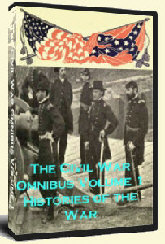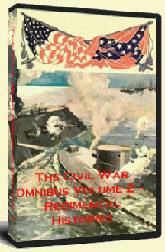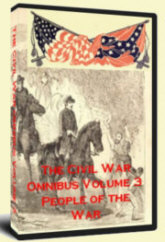A brown, chunky little chap, with a long body, short legs, not enough neck to hang him, and such long arms that if his ankles itch he can scratch them without stooping.Abraham Lincoln, describing Philip Henry Sheridan
Philip Henry Sheridan, or “Little Phil” as the 5 feet 5 inch tall officer came to be known, came out of relative obscurity toward the end of the Civil War to become one of the heroes of the Union effort. Succeeding where many older and more distinguished men had failed, Sheridan was able to assist in rousing the long-suffering Army of the Potomac into action and help General Ulysses S. Grant to defeat General Robert E. Lee and the Confederate Army of Northern Virginia.
Born in New York to Irish immigrant parents, Philip Henry Sheridan grew up in Ohio. In 1848, he began his military career at West Point. His years at West Point were not without controversy; during his third year, Sheridan was suspended for fighting with a classmate whom he’d previously threatened to bayonet. This scuffle, the result of some real or perceived insult to Sheridan, resulted in delaying his graduation by a year. He left West Point in 1853, graduating 34th of 52 cadets.
After graduation, Sheridan was brevetted into the U.S. Army, where he experienced combat in the Rouge River and Yakima Indian wars.
Brigadiers scarce; good ones scarce. … The undersigned respectfully beg that you will obtain the promotion of Sheridan. He is worth his weight in gold Letter written by Sheridan’s division, recommending him for promotion
Promoted to the rank of captain shortly after Fort Sumter, Sheridan served bravely though without distinction during the first year of the war. However, the tide turned at the very end of 1862, when at Stones River, Sheridan’s command of his division greatly aided the Union’s defense in the face of a Confederate push. The result was that Sheridan was promoted to major general.
Sheridan plowed on through 1863 in Tennessee, seeing action at the Battle of Chickamauga and the Battle of Chattanooga. But by early 1864, Sheridan would find himself in Virginia, handpicked to lead the cavalry arm of the most beleaguered of all the Union armies – the Army of the Potomac.
One of newly-minted General-in-Chief of Federal Armies Ulysses S. Grant’s first moves in his new position was to attempt to shore up the deplorable Army of the Potomac, which had suffered under the guidance of generals including George McClellan, Joseph Hooker, and Ambrose Burnside. While Grant gave overall command of the Army of the Potomac to General George Meade, he put Sheridan in command of the Cavalry Corps.
Sheridan often clashed with Meade, and his actions as a general in charge of a corps whose primary focus was intelligence and reconnaissance were often in question, but there is no doubt that by the time he moved on, the Army of the Potomac had been re-energized, and his reputation, due mostly to the fact that his command was responsible for the death of Confederate General J.E.B. Stuart at Yellow Tavern, was on the rise.
The people should be informed that so long as an army can subsist among them recurrences of these raids must be expected, and we are determined to stop them at all hazards. … Give the enemy no rest … Do all the damage to railroads and crops you can. Carry off stock of all descriptions, and negroes, so as to prevent further planting. If the war is to last another year, we want the Shenandoah Valley to remain a barren waste. Grant to Sheridan upon giving him command of the Army of the Shenandoah
Grant was well-pleased with Sheridan’s performance in the Army of the Potomac, so much that when he mustered an Army of the Shenandoah, he appointed Sheridan its commanding general, despite complaints from many that Sheridan was too young and inexperienced for the job.
Sheridan soon proved his detractors wrong. Although he organized his operation slowly, by September, Sheridan had defeated the Confederate’s man in Shenandoah, Jubal Anderson Early, no less than twice. However, defeating his enemy meant more to Sheridan than just meeting on the battlefield; Sheridan began Grant’s “total war” plan in Shenandoah before Sherman’s infamous March to the Sea burned through Georgia. Sheridan and his men embarked upon what would become known by citizens there as “The Burning,” commandeering livestock and provisions, burning barns and mills, tearing up railroads, looting civilians, and leaving over 400 square miles of the lush Shenandoah Valley a burnt waste.
When not engaged in burning and looting, Sheridan led his men to victory against Early and his Confederate troops at Winchester, a victory that, coming so close to the election, was credited with assisting Lincoln in securing a second term as president and made Sheridan the hero of song and poem. Sheridan received both Lincoln’s thanks and a promotion which made him the fourth ranking general in the Army, behind only Grant, Sherman, and Meade.
But Sheridan’s finest days in the service of the Union Army, and his final descent were still ahead.


